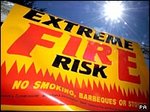LIFE-saving smoke alarms designed for deaf people will be fitted free by the fire brigade as part of an awareness drive.
During Deaf Awareness Week next week, North Yorkshire Fire & Rescue Service is teaming up with RNID - the national charity for deaf and hard of hearing people - to raise awareness of special smoke alarm systems, which could save the life of a person with hearing loss in the event of a fire.
Station manager Carl Boasman, said: "It's really important that people have working smoke alarms and, more specifically, for people who are deaf or hard of hearing to have special smoke alarms.
"This is particularly important for deaf or hard of hearing people living in rented accommodation, which may have a standard smoke alarm that is unsuitable for them.
"Contact us on 01609 788545 and we will visit your home to give fire safety advice and fit a smoke alarm that meets your needs."
A third of people with a hearing loss say they would have difficulty waking up to a conventional alarm, especially considering most remove their hearing aids before they go to sleep each night.
Almost a quarter, 23 per cent, say they would struggle to know if the alarm went off during the day.
"Deaf people need to place a vibrating pad under their mattress or pillow at night. If smoke is detected, the alarm will sound and set off the pad to assist in waking them," said Mr Boasman.
"We all have a part to play in creating safer communities. Deaf Awareness Week is an ideal opportunity for those who know anyone who is deaf or hard of hearing, to make sure they have alarms that meet their needs."
Brian Grover, head of technology and research at RNID, said: "Fire can strike at anyone's home, but not everyone is equally protected because deaf people cannot rely on hearing an ordinary alarm.
"We encourage deaf and hard of hearing people to think about their personal fire safety and ensure they have the right alarm for their needs." Deaf Awareness Week promotes the positive aspects of deafness and social inclusion, and raises awareness of the huge range of local organisations that support deaf people and their family and friends.
How do smoke alarms work?
Read Article: The Press



No comments:
Post a Comment